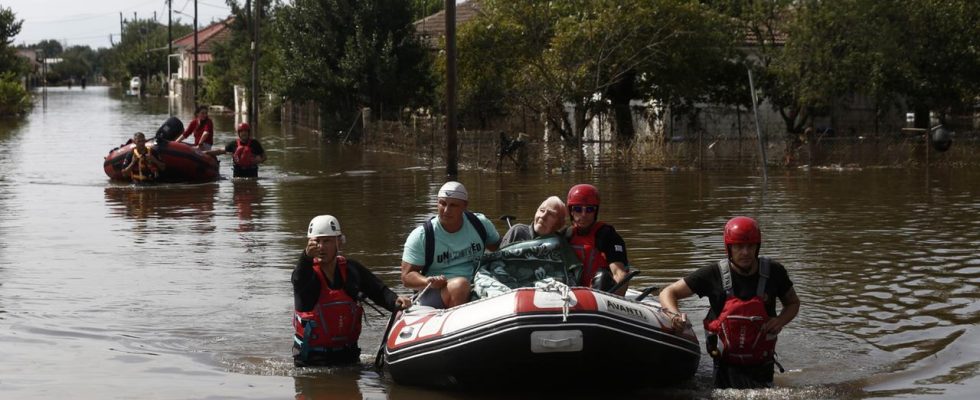In Greece, the death toll has risen to eleven after severe flooding. More people are missing and several villages cannot be reached. Meanwhile, the risk of epidemics is increasing.
The death toll in the flooded regions of Greece has risen to eleven. The body of a 77-year-old was found by residents on a beach on the Pelion peninsula in central Greece, authorities said. The man had been missing for three days. It is feared that there are more victims. At least six people are still missing, including a couple from Austria who were on the peninsula.
Dark blue: Flooded areas, based on data from the Greek weather service Meteo, which is based on satellite data from Sentinel-1.
Many places are still cut off
Authorities estimate that more than 73,000 hectares remain under water. The rescue teams have not yet been able to reach all of the villages cut off by the water. “Many people are still trapped,” fire department spokesman Yannis Artopios told broadcaster Mega, especially in the villages around Karditsa, Palamas and on the way to Trikala in central Greece.
As an AFP journalist reported, numerous houses in Palamas were still under water on Saturday. “It was really hellish,” said 54-year-old resident Eleni Patouli. “We were stuck for hours with no help and no information.”
Rescue work go on
The situation remained worrying a few kilometers further east near the town of Larissa. “We are having great difficulties with the Pinios River near Larissa, which has overflowed its banks,” said fire department spokesman Artopios. On the outskirts of the city, the river had swollen to a height of 2.5 meters.
The fire brigade and army continue to work to rescue hundreds of people from remote villages. People continued to be rescued throughout the weekend using helicopters, inflatable boats and tractors. According to the fire department spokesman, more than 2,850 people have been rescued since the storm began.
Danger of epidemics due to polluted water
Because of the stagnant water, the risk of epidemics also increases. People are strongly advised to only use safe drinking water, such as bottled water, and under no circumstances use flood water.
“There is a risk of an epidemic,” warned epidemiologist Gikas Magiorkinis on the Skai news channel. In the affected, largely rural region, there are dead sheep, goats, pigs, dogs and cats. The number of mosquitoes is also said to have increased significantly.
In the largely muddy port city of Volos, the Ministry of Health warned of drinking water contamination as the water supply is restricted due to damage to pumping stations and pipes. Work has now begun to restore the water and electricity supply there.
Traffic severely affected
Traffic is also still affected. For example, the main road between the second largest city Thessaloniki and the capital Athens is still closed along a section of around 70 kilometers, the police said. Travelers between northern and southern Greece have to accept major detours.
Due to the severe damage and chaos on destroyed and flooded streets, the start of the school year, in Greece this Monday, was postponed in the particularly affected areas.
After a heat wave with devastating forest fires, it has also rained heavily in Greece’s neighboring countries Turkey and Bulgaria in the past few days. The authorities there reported a total of twelve deaths.

